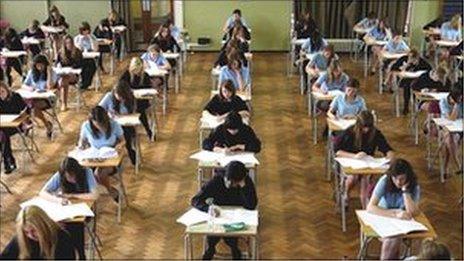A-levels results in Wales: The crib-sheet
- Published
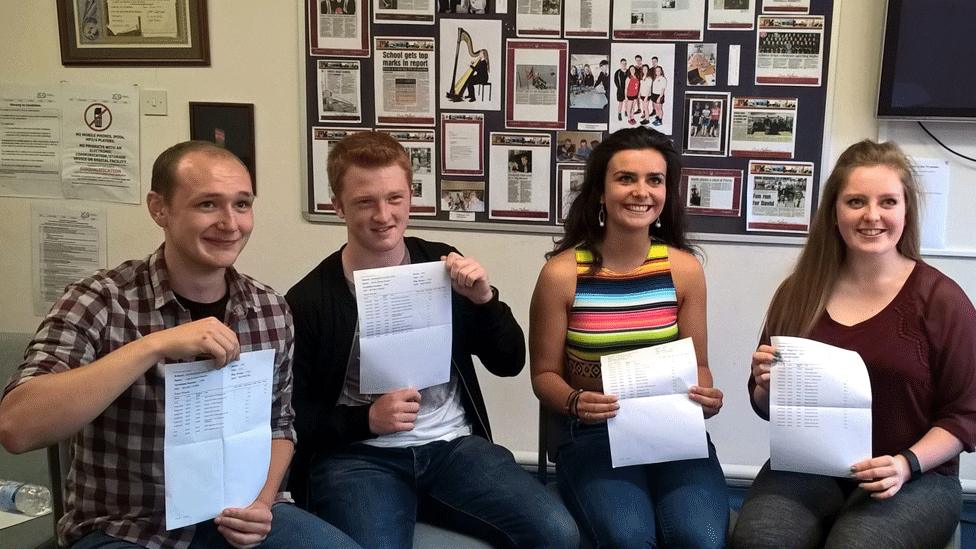
A Level students at Ysgol Eirias in Colwyn Bay celebrating record results
Thousands of students in Wales have received their A-level results, while universities will over the next few weeks deal with hundreds of remaining places through clearing.
Students earlier this summer took a total of 35,537 exams.
But what do we know about how well Wales is doing? How many students are going to university? And what happens next for those still with big decisions to make?
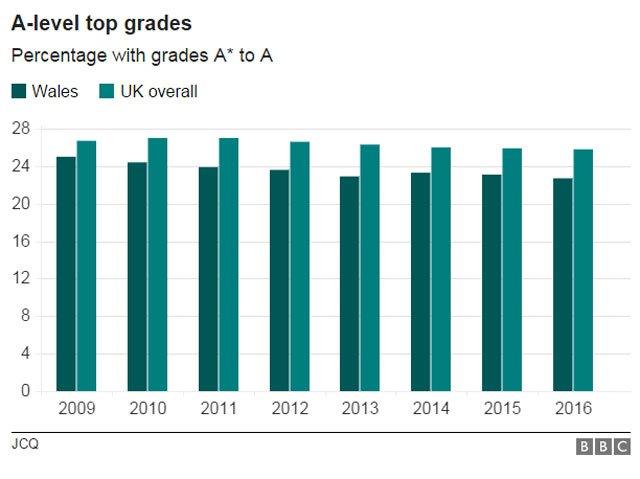
MAKING THE GRADE
A new top grade, A*, was introduced in 2010. A total of 6.6% achieved this in 2016, a fall on last year and still short of the UK average of 8.1%.
The proportion of students getting A* and A also fell again from 23.1% to 22.7% and Wales continues to trail the rest of the UK and all regions of England apart from the North East of England.
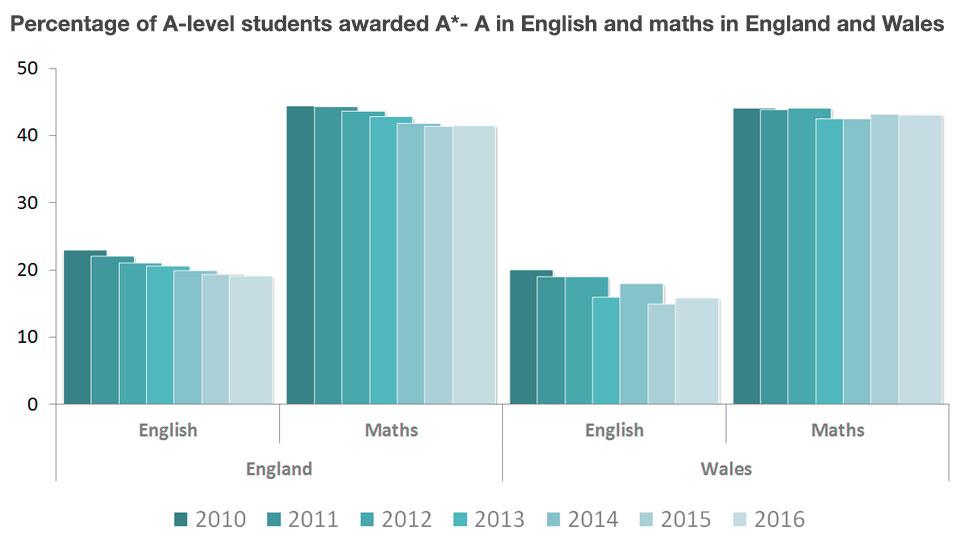
When you look at individual subjects, more students in Wales have been getting top grades in maths over the last five years than in England - but in English language, Wales has been trailing, with the gap still 3.2% in the latest set of results.
In French, 31% got A* to A in Wales - this is an improvement, but 37.8% managed that in England. The gap was as wide as 14% in 2012. Numbers of students taking French have also gone down by 11% this year.
Wales and England are a little further apart now at the top grades for A-level physics, with Wales dropping back to 25.8% behind England on 29.6%.
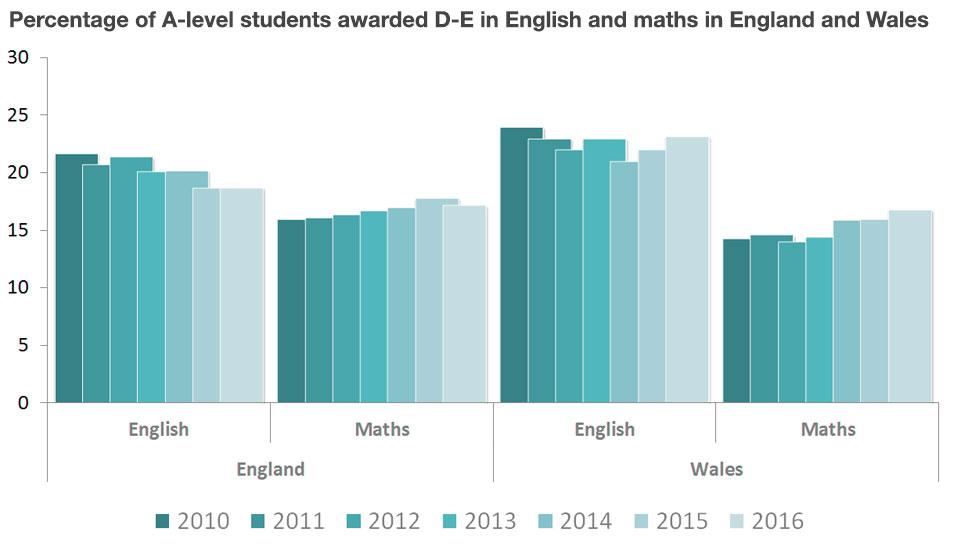
It is worth looking too at how many students are only getting the lower grades.
A slightly higher proportion in Wales - 23.5% - got D and E grades, compared to 20.6% in England. That gap has also widened slightly too.
Wales has more students getting these lower grades in English (23.2%) than who managed A* to A (15.9%) in the same subject.
A guide to A-level results and how to survive them
There is also a more students getting D and E grades in French in Wales than in England for most of the last six years.
David Evans, secretary of NUT Wales, said A-levels were the first time students specialised in subjects and it was important the quality of education and teaching was there.
"We need to look at the numbers who get A* and celebrate them, and those who get As, Bs and Cs too," he said.
"We need to make sure we have a clear focus on those who achieve the grades they need for university and makes sure support is there for those who go on to do other things as well."
On the question of whether A-levels are getting easier, Phil McTague, head teacher of Ysgol Eirias in Colwyn Bay said: "If Usain Bolt sets a new record in the hundred metres, people don't say the hundred metres is getting easier! Our students have worked really hard this year and we're proud of all their results."

HOW DOES WALES COMPARE WITH ENGLISH REGIONS?
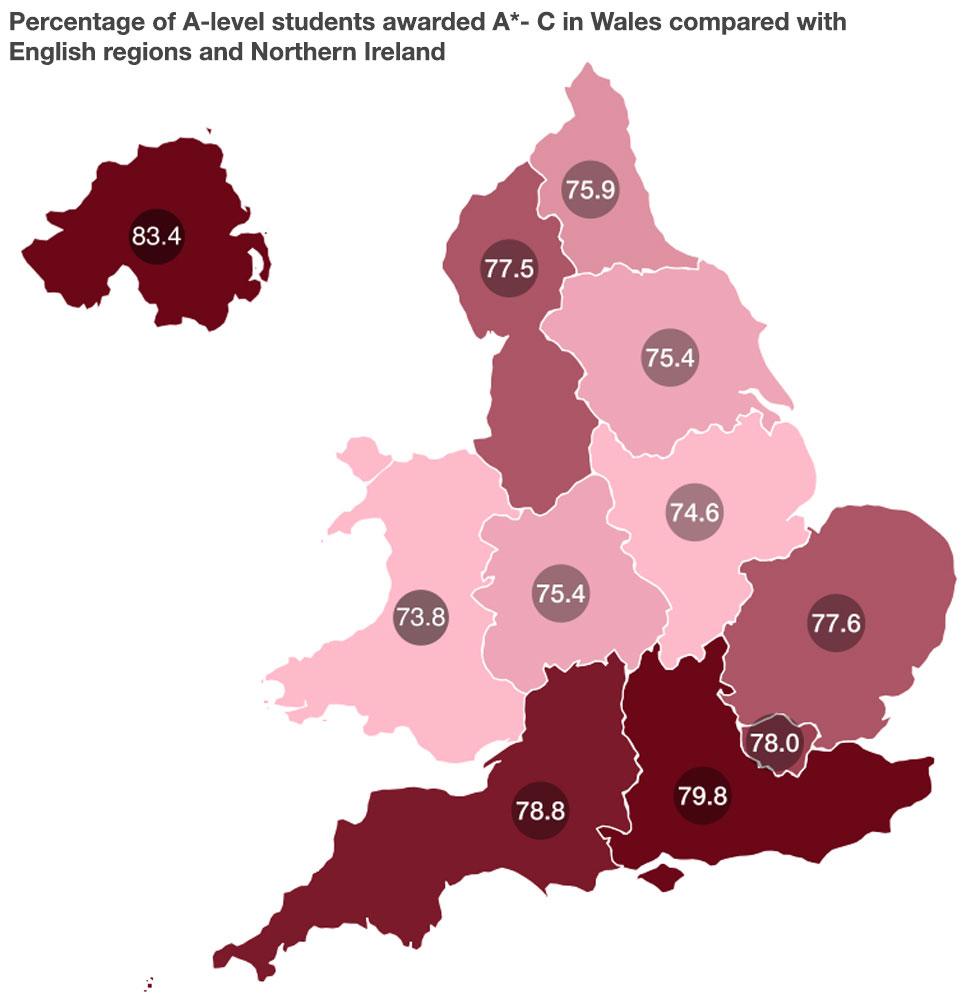
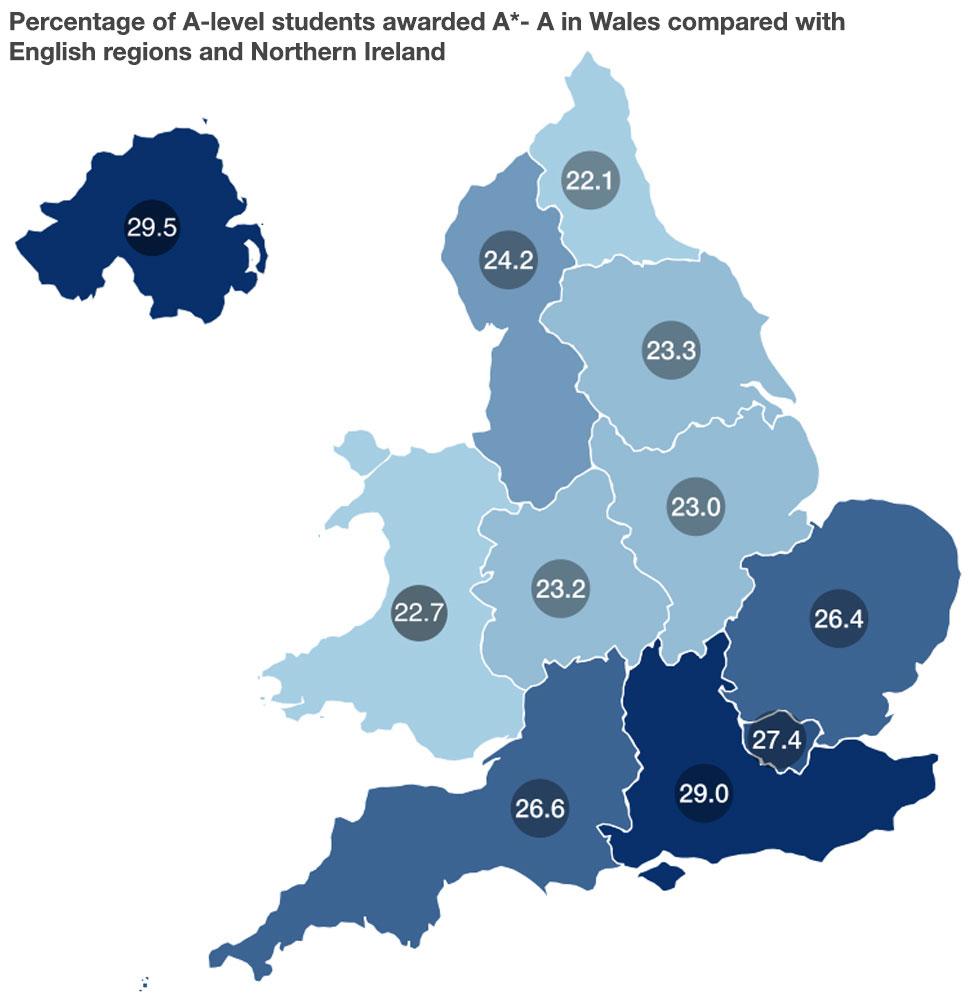
For the first time last year, we were able to compare Wales' results with regions of England on the day they were published.
Wales has the lowest percentage of A*-C grades of any area - 73.8- including every English region.
It also has the lowest for A* and A - apart from the North East of England, which is now lower than Wales.

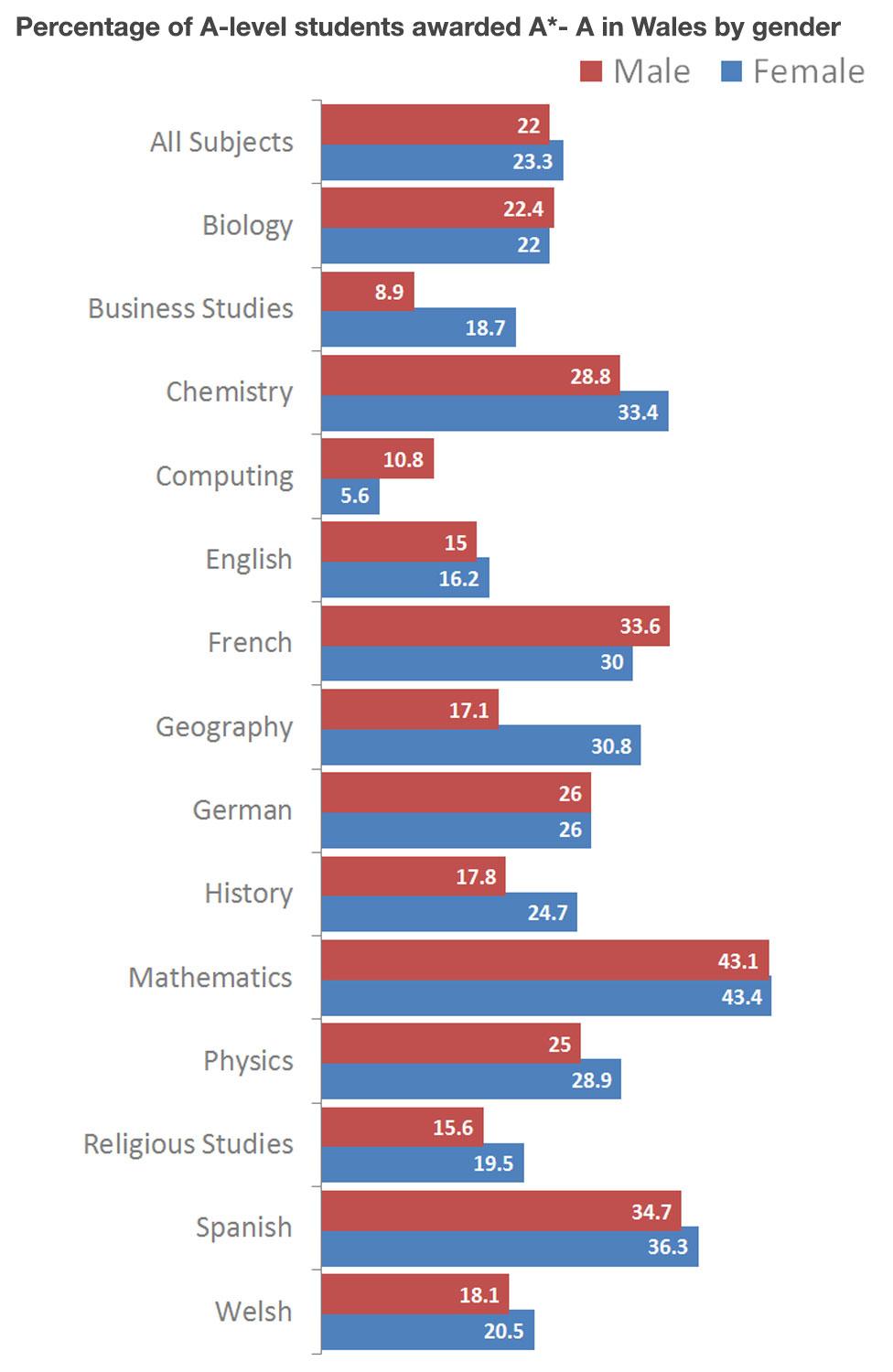
WHAT IS THE PERFORMANCE DIFFERENCE BETWEEN BOYS AND GIRLS?
Girls continue to outperform boys overall in Wales, with 97.9% of entries by girls this year gaining A* to E grades, compared to 96.5% of boys.
At the A* grade, the performance of boys was marginally better than that of girls, with 6.7% of boys and 6.5% of girls gaining A* - both improving since 2013.
You can also see performance differences between boys and girls for the top grades within subjects - as well as a difference in subjects chosen. The likes of physics and computing are very male dominated compared to French, English and Welsh at the other end of the scale.
Gareth Pierce, chief executive of the WJEC exam board, said some of the patterns were long standing "and a natural feature".
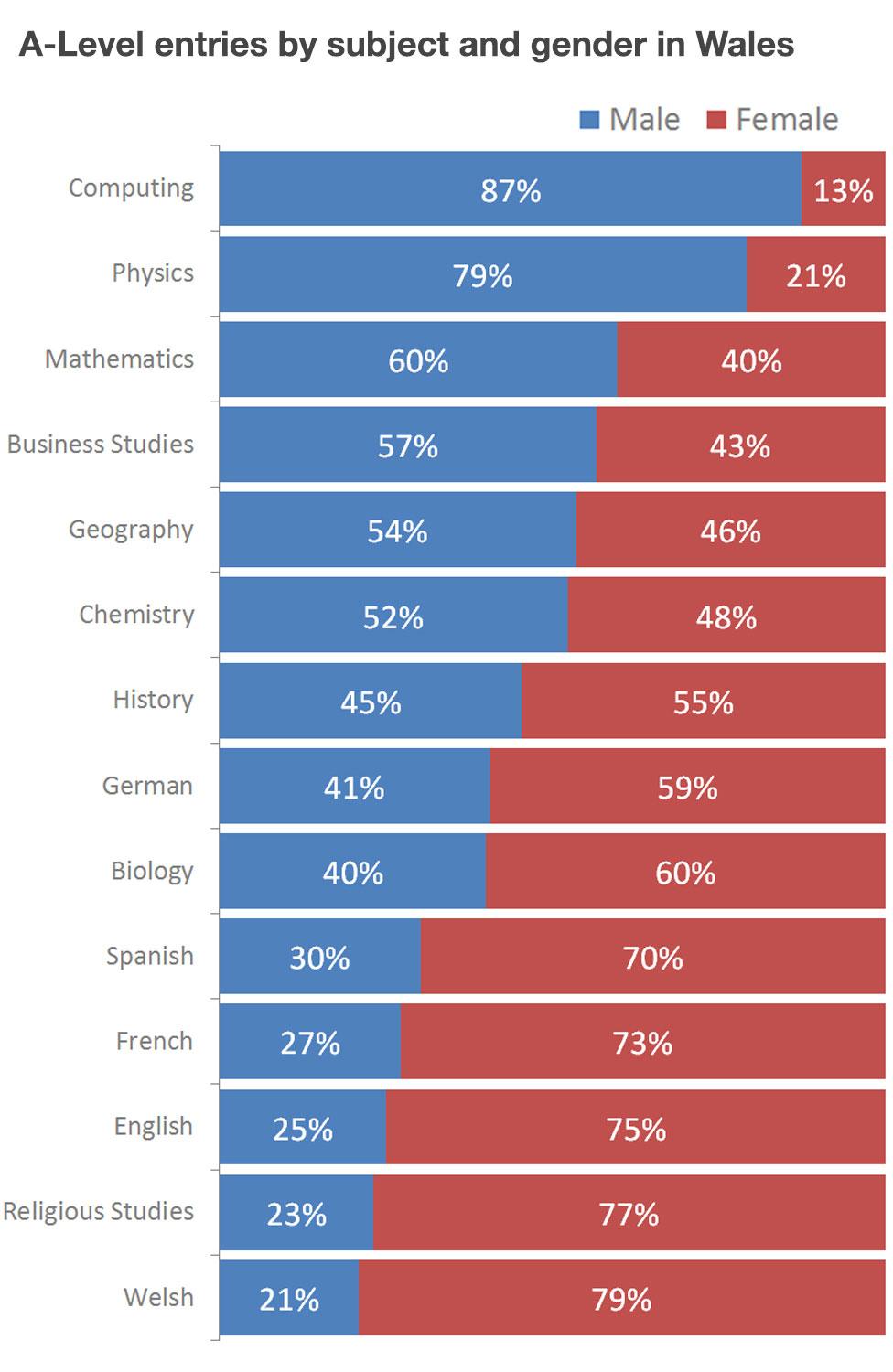

HOW MANY STUDENTS APPLY FROM WALES?
There were 23,740 students from Wales applying to universities in the UK this year - and with many looking at more than one university, this meant a total of 40,010 applications to Ucas.
There is very little difference in the number of students from Wales applying to university over the last few years.
More than half a million students got higher education places in the UK last year - three quarters of those who applied. These included 20,500 students from Wales, a 1.7% rise and a new high, while 87.5% of 18-year-olds from Wales who applied got places.
Of those 18-year-old students who applied to Welsh universities, 84% got an offer, while 75% of Welsh applicants to English universities got an offer.
Although there is a lot of attention at schools on results day - only around half of those entering university are 18-year-olds; others take gap years while the number of students over 26 is rising again.
By the end of Thursday, Ucas said 17,510 students from Wales had places in higher education - more than at the same time over the last five years.
STILL, MORE 18-YEAR-OLDS ARE GOING TO UNIVERSITY
Wales recorded its highest entry rate - 28.2% of all 18-year-olds got higher education places through Ucas in 2015 - although that is behind England on 31.3%.
Wales has had one of the lowest proportional increases of UK nations and regions since 2006 - 13%.

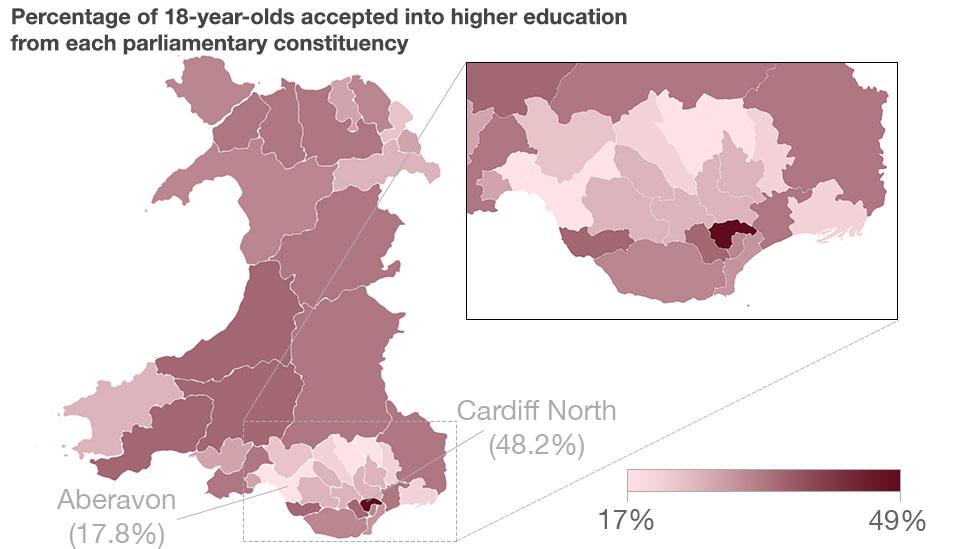
WHERE YOU LIVE CAN BE A FACTOR
Fewer pupils from poorer parts of Wales get to university.
Entry rates are broken down across the UK into constituencies and analysis shows they are lower in more disadvantaged areas.
In Wales, the entry rate range is from just under 18% of 18-year-olds in Aberavon, to just over 48% in Cardiff North.
For those in the most disadvantaged districts in Wales the average rate is 16.6%, almost the same as the year before.
But compared with entry rates five years ago, 18-year-olds from disadvantaged areas in Wales were 23% more likely to be accepted for entry in 2015 - in England they were 30% more likely.
Meanwhile, students living in what are classed as the most advantaged areas of Wales are five-and-a-half times more likely to go to a university with higher entry requirements than those from the most disadvantaged parts.
Leading academic Prof Sir Deian Hopkin said the numbers from poorer backgrounds getting to university were still disappointing despite efforts.
"One of the great challenges in higher education is to attract students from less-affluent backgrounds because. very often, they come from an education system which doesn't encourage them to come to university in the first place," he said.
"Now a lot has been done over the years, there has been a big improvement, but the proportion has not grown at the same rate as the total increase in students in higher education. Therefore the challenge remains."
Prof Hopkin added: "The disappointment in England is that the grant which supported many students has been abolished.
"In Wales, at least that has been maintained for now, but we need to see far more effort being put into encouraging, supporting and, indeed, mentoring students from backgrounds where these things are not natural."

WHERE DO STUDENTS AT WELSH UNIVERSITIES COME FROM?
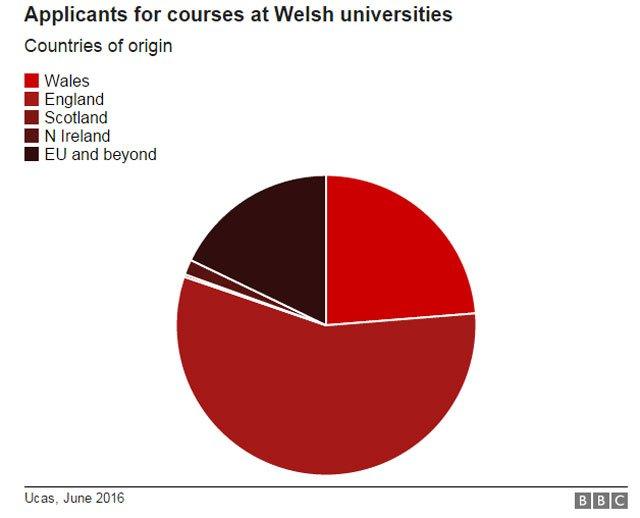
Altogether, 77,750 students have already applied to Welsh universities - 18,450 from within Wales.
The chart shows where the others come from - more than half of them from England.
UNCONDITIONAL OFFERS ON THE RISE
There has been a rise in students receiving unconditional offers from universities - which will have relieved the exam pressure a little for some. Across the UK, offers were made to 23,400 students in 2015, compared to only 3,000 two years before.
This is around 2.5% of applications and involves 36 institutions, but there is no breakdown of how many are from Wales.
Cardiff and Swansea universities only made unconditional offers to students who are pre-qualified. This amounted to 1,200 for Cardiff this year.
Aberystwyth University said it made offers based on performance in its own scholarship exam, while Bangor University said it made unconditional offers to some of the most promising students, but they were looking "at the whole package" before deciding where to go.

CLEARING: NO LONGER A LAST RESORT
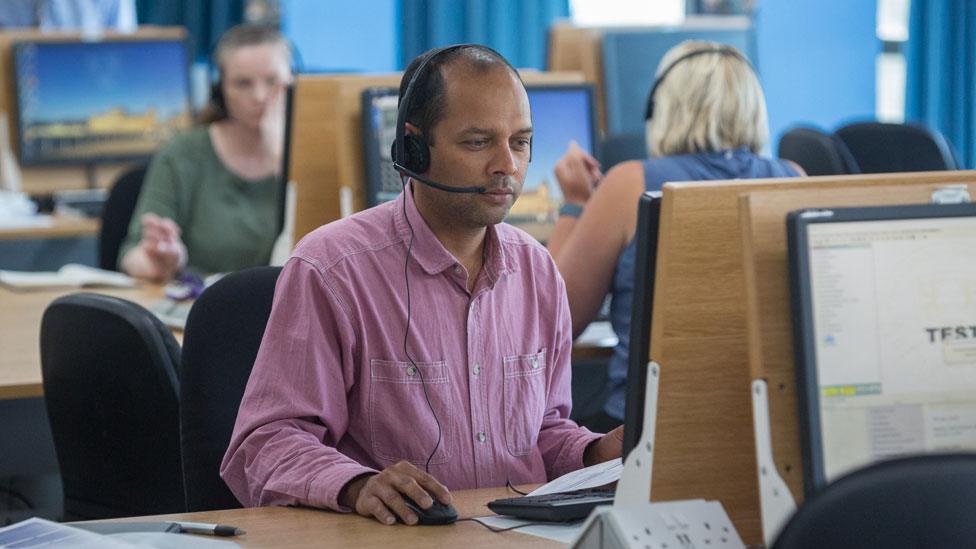
Around 4,100 students from Wales were looking for places on results day through the clearing system, which is a lower number than the last five years.
A total of 300 students from Wales were given places on the first day, according to Ucas.
Clearing has become more of an accepted way in, no longer something to be embarrassed about for not getting the right grades.
Ucas says clearing has "transformed into a respected and important route" into higher education.
All Welsh universities are promoting their clearing services heavily, promoting many courses across the board.
Cardiff University had around 400 places available through clearing.
Bangor University said it was "no longer seen or used as an opportunity of last resort" and said it was seeing more students waiting to get their results before applying.

David Moyle, Aberystwyth University's schools and colleges liaison manager, said there was no longer a stigma attached to clearing.
The university took 1,000 calls last year and was offering "a limited number of places" across 315 courses, with demand expected to be high in science and computing.
The aim is to ensure students "get the best advice to make an informed decision", said Mr Moyle.
Back in 2013, Ben Grantham's A-level results were better than he expected and he was on the phone within an hour to clearing to get a place studying media and communication.
"With a process such as clearing it's important to act fast," said Ben, who recently graduated with first class honours.
"Hundreds of students will be in a position where they wish to apply for a course immediately following their results, and places are often limited and can fill up fast."
Joanna Harris, of Careers Wales, said clearing could sometimes be a blessing in disguise to give students a chance to reflect and warned against making rushed decisions.
"Take a breath, do your research, look at the Ucas website , externalfor what's available or even ring the university you wanted to go to to see if they might still accept you first.," she said.
"There is often more than one university in towns and cities - don't make a rash decision, it's important, with the amount of money it will cost you, that you make the choice of course that's right for you."

CLEARING DETAILS
Aberystwyth University , external0800 121 40 80 @AberUni
Bangor University, external 0800 085 1818; 0800 328 5763 (Welsh lang) @BangorUni
Cardiff University, external, 0333 241 2800 @cardiffuni
Cardiff Metropolitan, external 0300 330 0755 @cardiffmet #cardiffmet
Glyndwr University , external 01978 293439 @GlyndwrUni
Swansea University, external 0800 094 9071 @SwanseaUni
Trinity St David, external 0300 323 1828 @UWTSD
University of South Wales, external 03455 76 06 06 @UniSouthWales
UCAS, external Follow #Clearing and @ucasclearing on Twitter 0371 468 0 468

OTHER ROUTES
Only two thirds of 18-year-olds who left school last year went on to university, according to research by Careers Wales.
One in five went on to further education or continued in other full time study.
14.5% went on to training or employment in the workplace.
Almost 4% were not in education, employment or training two months after results day.
WHAT IF I DON'T GET THE RIGHT GRADES?

Kerry Ann Wallace started a youth work apprenticeship after A-levels
Kerry Ann Wallace, 20, from Newbridge, Caerphilly, was upset after failing to get the right grades to study psychology last year but was in touch with a careers adviser.
It led her to a youth work apprenticeship at Torfaen council and she has ambitions to be a family support worker.
"I haven't looked back and it's great to be earning money while I learn," she said.
"If you're disappointed this week please go and talk to someone as I did, look online for things and don't be upset - find something you love."
Career adviser Joanna Harris, of Careers Wales, said it was important to take stock and look at options - but volunteering, an internship or part-time work can be useful additions to CVs ahead of the next step.
Some will retake exams but there are also useful websites, such as notgoingtouni, external, which can point students on the career path, including apprenticeships.
"There's a choice," said Ms Harris. "Just because you didn't get into Cardiff University, say, there might be a course somewhere else, there are foundation degrees and feeder degrees.
"If you're struggling, book an appointment with us, external or call us."
- Published10 August 2016
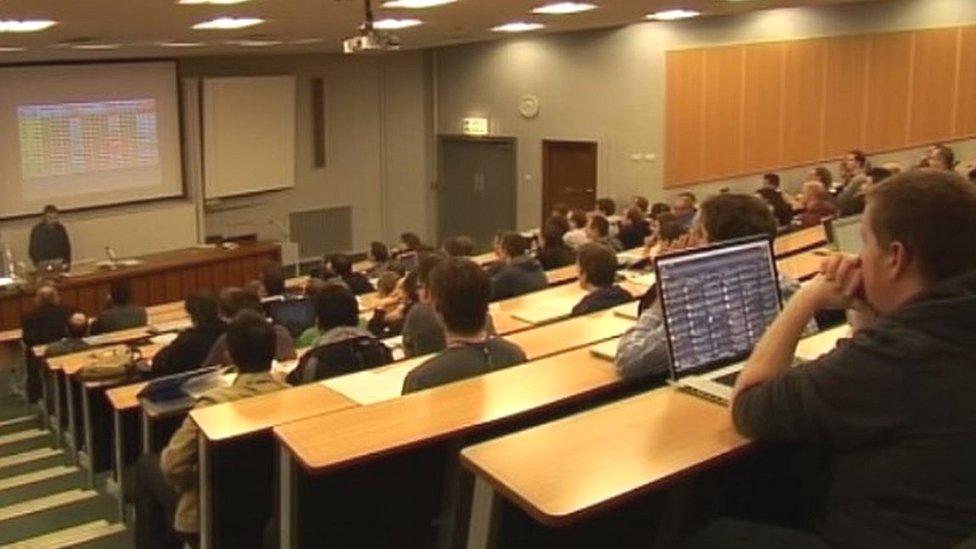
- Published13 August 2015

- Published21 January 2014

- Published8 September 2014
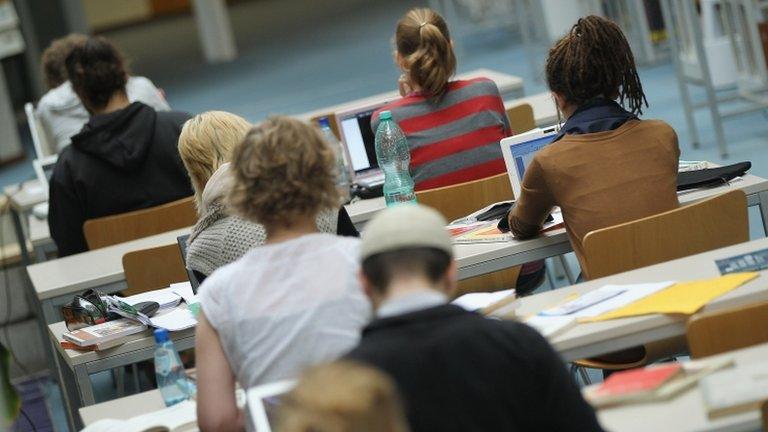
- Published15 August 2013
